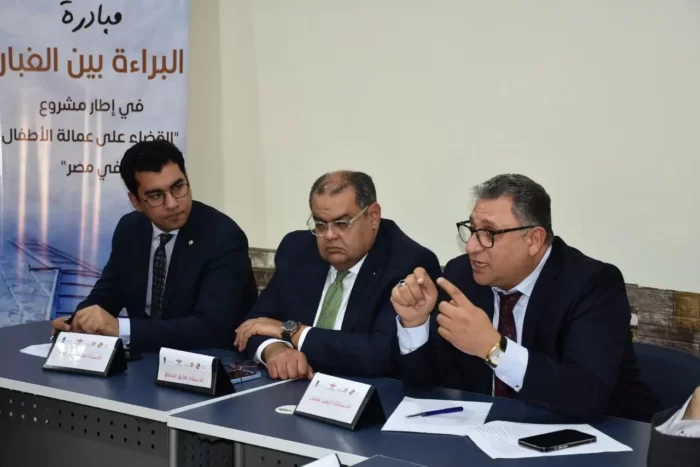Okeil: The initiative aims at the cooperation of civil society, the government, and stakeholders to eliminate the phenomenon of child labor
Within the framework of the project entitled: "Elimination of Child Labor in Egypt", Maat for Peace, Development and Human Rights held the first seminar of the initiative entitled "Innocence is Lost Among the Dust", which aims to achieve Target 8.7 of the UN Sustainable Development Goals calling for an end to child labor in all its forms by 2025.
The seminar discussed the laws regulating child labor in Egypt, the challenges facing combating child labor in practice, in addition to child labor in quarries in Minya Governorate, and the mechanisms to address them, with the participation of elite legal and media experts, law professors, representatives from the National Council for Childhood and Motherhood, and relevant stakeholders. The seminar was moderated by Abdellatef Gouda, a researcher at Maat in charge of the file on combating hate speech and violent extremism, moderated the seminar.
During the seminar, Ayman Okeil, an international human rights expert and president of Maat, discussed the worst forms of child labor that are most common in Egypt, explaining that the Egyptian state has signed and ratified many international agreements that aim to eliminate child labor. Article 80 of the Egyptian Constitution prohibits the employment of a child before he reaches the age of completion of basic education. It is also prohibited to employ him in jobs that expose him to danger. However, the phenomenon of child labor is still worrying due to its negative effects on society in general and children in particular.
The human rights expert stated that the “Innocence Among the Dust” initiative comes within the framework of the efforts exerted to urge the Egyptian government to join the 8.7 coalition to reduce child labor, and indicated that the initiative is mainly based on dialogue between civil society, the government and stakeholders to develop a roadmap to eliminate the phenomenon of child labor from By raising awareness about the issue and working to provide comprehensive protection for the child and his family.
Tariq Ishaq said that the economy is a key factor driving children to work, stressing that the initiatives should target the family and the child together, not just the child. Ishaq also highlighted the efforts of the SDG Alliance 8.7 and the opportunities for networking, cooperation, and exchange of experiences within the framework of eliminating this phenomenon. The Egyptian government's accession to the SDG Alliance 8.7 is an implementation of the National Human Rights Strategy and the National Plan to Combat the Worst Forms of Child Labor 2018-202, Ishaq explained.
Ayman Abdel Rahman, Responsible for the child labor file at the National Council for Childhood and Motherhood, highlighted the role of the Council to confront the phenomenon of child labor, especially in the Minya Governorate. He also indicated that the reasons for the repercussions of the phenomenon must be identified before trying to approach it so that its negative impact does not extend to society as a whole, emphasizing the intensification of awareness-raising programs about the dangers of the phenomenon and the increase of inspection campaigns at workplaces.
Counselor Ayman Fouad also addressed the most important Egyptian laws and legislation dealing with children's rights as an essential part of local efforts. He explained the main themes and items of the National Plan to Combat the Worst Forms of Child Labor 2018-2025.
Maat implements the "Innocence is Lost Among the Dust" initiative in partnership with ADMC and the Dutch agency RVO. The initiative is in line with the sustainable development goals and the national plan to combat the worst forms of child labor. It also aims to raise awareness about the fundamental right of children to receive quality and free education and to achieve Target 8.7 of the UN Sustainable Development Goals calling for an end to child labor in all its forms by 2025.
shortlink: https://maatpeace.org/en/?p=37672












